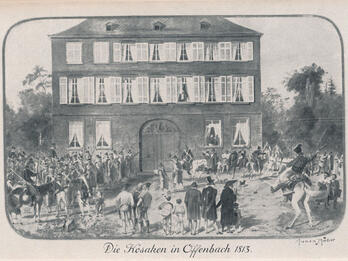Derushe ha-tselah (Sermons [of Landau])
One who exchanges good for bad and bad for good, and says that transgressions are really virtuous deeds, and that it is by this means that one can bring the Will of the Creator to fruition—such an individual will never repent, and likewise, one who denies the Providence of the Holy One, blessed be He, over earthly creatures, and says: “The Almighty has abandoned the earth!” and who denies that there is divine reward and retribution, it is clear that such a person will not repent; and while these two groups are, in various ways, different from one another, the common factor they share is that they harm all who approach them and pay attention to their statements; they are two distinct groups, both prevalent in our times: the first group is that of Shabetai Tsevi—may his bones rot—they are the ones who declare that that which is evil is really good, and all transgressions are deemed by them to be virtuous deeds; they are sunk in the depths of uncleanness. The second group are the current philosophers who say of the Creator that His ways are exceedingly elevated, that He is high and exalted and has no concern with earthly creatures—and they maintain that everything is governed by natural processes. Now the Alshikh1 has already explained, in connection with the verse (Psalm 139:20): “Who utter Your name with wicked thought: they take it for falsehood, even Your enemies,” that “Your enemies” is to be understood thus: they who hate the Almighty are the very ones who elevate Him in a false manner; since, by such means, they have found a way to spurn the entirety of the Torah and the divine commandments, by declaring: “The Torah is not from Heaven,” and they deny the prophecy of Moses our Teacher—peace be upon him—and regarding all the miraculous phenomena recorded in scripture, they attribute these to Nature—Heaven forbid—as a result of that viewpoint; anyone pursuing their path destroys his heavenly reward with contempt.
An allusion to these two groups has been made by the prophet [Micah]; in respect of the first group, he has declared: “With the garment, you strip off also the mantle.” That is to say, when performing the commandments, one clothes oneself in robes, and through one’s commission of transgressions, one strips off the garments of light and clothes oneself in filthy garments. And the expression “with the garment” must be understood to mean: “That from which one will obtain the merit to clothe oneself in a garment”—which, for us, is the observance of the commandments and the protection of the soul from the filth of transgressions, as scripture states: “At all times let your garments be white”—where you desire to become worthy of this, they do the opposite; “they strip off the mantle”—that is to say, they commit despicable transgressions, incest and the consumption of prohibited foods—and there can indeed be no better example of “stripping off the precious mantle” than this; by doing such things, they think that they are covering themselves with light, as with a garment, for this type of thing is regarded by them as a worthy deed! Woe unto them and unto their souls and unto all who support them! In regard to the second group, the prophet has declared: “From them that pass by securely”—for even the wicked man who is most despicable in his evil—even one who is wicked in his rebellion against the entirety of the Torah—enjoys no rest, and his heart smites him, and he fears the awesome nature of the Judgment, and does not commit a transgression with any sense of security; but these wicked men, who deny Divine Providence, and who deny that the Torah is from Heaven—they commit a transgression with sated soul, and with a sense of security, without any fear or worry, and they do not even experience anxiety in the face of the Day of Judgment. This is what is meant by the phrase: “From them that pass by securely, so that they are as men returning from battle”—i.e., like valiant soldiers when they return from battle after having defeated the enemy, and who are thus in no fear of anything whatsoever.
Now these two groups are not like one another; the group following Shabetai Tsevi have no faith within them; they deny the cardinal principle of belief in the Unique One of the Universe, whereas the group of the philosophers are sound in their belief in the divine Unity, but have fallen into the pit by reason of their declaration that His ways—blessed be He—are too elevated to have any effect upon earthly creatures, and they wish to deprive the Creator of responsibility for those things that they find problematic in relation to the divine conduct of the world. Accordingly, they have falsified the Torah and the faith, but have brought up mere clay in their hands, as they fall into even greater difficulties. The more they display their sophistry in this regard, they fall into various snares consisting of mighty problems and great doubts. May the spirit of those delving into matters too wondrous for them, which they will never be able to grasp, be blown away! Indeed, in regard to their own souls, which are within their bodies, all the philosophers have wearied themselves in their investigation into its exact nature—so how can they make investigation into the nature of the One Who is higher than the Highest! [ . . . ] Now these two groups differ from each other in regard to the question of the divine Unity, but in any event, the group of philosophers is better than the group of Shabetai Tsevi, which impairs the belief in the Unity; however, insofar as the question of observance of the Torah and the divine commandments is concerned, they are both equal in being total uprooters of the Torah and the commandments.
And when we examine carefully the rabbinic epigram: “Know what is above you, an eye that sees,” etc. [ . . . ]
In my humble opinion, it appears that our Holy Master [R. Judah the Prince] has hereby informed us that whatever is wrought above, in the celestial heights, all stems from ourselves, from our deeds and the study of our Torah, and our prayers—it is all required by the Almighty, and there is not a single matter throughout our entire Torah that constitutes just a bare decree, without a reason; although the reasons behind all the statutes are concealed from us, that is only due to the level of our understanding, but in actual fact, everything is governed in accordance with justice. Hence our Holy Master declared: “Know what is above!”—that you should be aware that everything that is wrought in the celestial heights of Heaven stems in its entirety from you, and it is by dint of your own power that everything takes place, and is it not, then, like a ladder stationed on the earth, with our heads reaching to the heavens? And accordingly we, the Jewish people, must guard ourselves against any dross or trouble resulting from any sin, even a minor one.
Notes
[Moses Alsheikh, ca. 1520–1593, Safed rabbi.—Ed.]
Credits
Published in: The Posen Library of Jewish Culture and Civilization, vol. 6.




